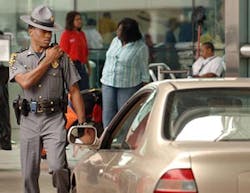Governor Asks Marylanders to be Vigilant After London Bombings
ANNAPOLIS, Md. (AP) -- The state responded Thursday to deadly bombings in London by stepping up security on transportation systems and appealing to Marylanders to help authorities watch for signs of potential terrorist activity.
''This is a war,'' Gov. Robert Ehrlich said. ''We need increased vigilance.''
He commended commuters who reported suspicious packages at two subway stations Thursday morning in the Maryland suburbs of Washington, D.C., even though the packages turned out to be harmless. Each station was closed for about an hour, the governor said.
Following the lead of the federal government, the state increased its terror alert code from yellow to orange for mass transit facilities, which meant passengers could be required to show a ticket and identification before entering stations.
''That does not mean everyone will be checked,'' Ehrlich said. ''It does mean that everyone entering such facilities must have a ticket and identification available.''
News of the bombings in London came about the time the morning commute started in Maryland, but transit systems in the state, which carry about 350,000 passengers a day, operated normally and passengers seemed to take the bombings in stride.
Ann Trumble said she heard about the bombings in London before leaving home for her commute on a MARC train from Duffields, W.Va., to Rockville, but had no fear of riding the train.
''It does always give you pause when you hear about terrorism on public transportation, but I think the MARC is probably one of the safest public transportation systems,'' she said. Trumble took comfort from the fact that riders must pass conductors as they board the trains.
At the AMTRAK station in Baltimore, where five armed police officers stood guard while two more sat on bicycles outside, the terminal was crowded with Shriners leaving town after their national convention.
Shriner Bob Archibald of Boston said he noticed more security than when he arrived Saturday.
''I feel as safe as you can be, but you never know,'' he said. ''All this really means is there will be a little more security.''
At a subway station in downtown Baltimore, Bill Paznekas said he wasn't worried about riding the Metro because ''there are too many other things in life that one has to deal with.''
''It's a regular day for me, but naturally I feel sad for all of those people in London,'' he said.
Baltimore Mayor Martin O'Malley said the city was keeping in touch with state officials. O'Malley also sat in with local authorities in the city's new Watch Center, where security personnel can monitor high-traffic areas in the city with video cameras. Cameras were focused on the city's light rail and train tracks as well as the city's Inner Harbor area and downtown.
Some homeward-bound riders on MARC's Brunswick Line said security was noticeably increased Thursday afternoon at Washington's Union Station, where railroad workers took the unusual step of checking tickets in the boarding area as well as on the train.
While most travelers who were interviewed said they weren't worried, Michelle Bah of Gaithersburg said she missed a flight for a business trip to Charlotte because she didn't want to go and relented only after she was talked into it by a friend.
Waiting at Baltimore-Washington International Airport for another flight, she said she was scared, ''but things have to be done.''
Ehrlich said there was no information concerning any specific threat to Maryland, and the terror alert remained at yellow for everything except mass transit. But the governor said security was increased at the Chesapeake Bay Bridge and other toll bridges and tunnels, which are used by about 421,000 vehicles a day. Security also was tightened at the Port of Baltimore.
The governor said he was notified a little after 6 a.m. by Dennis Schrader, Maryland's homeland security director, that bombs had exploded in subway stations and a bus in London.
''By 7 a.m., all of our systems are go. Believe me, that is a dramatic improvement from (tropical storm) Isabel,'' the governor said.
State emergency management officials conferred with federal officials in Washington and talked to local police, emergency responders and elected officials via a conference call to coordinate their response to a terrorist attack if one occurred.
Ehrlich tried to reassure Marylanders, telling them, ''Live free. That's why you are Americans.''
''Because they do not have popular support..., they (terrorists) turn to fear. To the extent terrorists spread fear, they win,'' the governor said.
